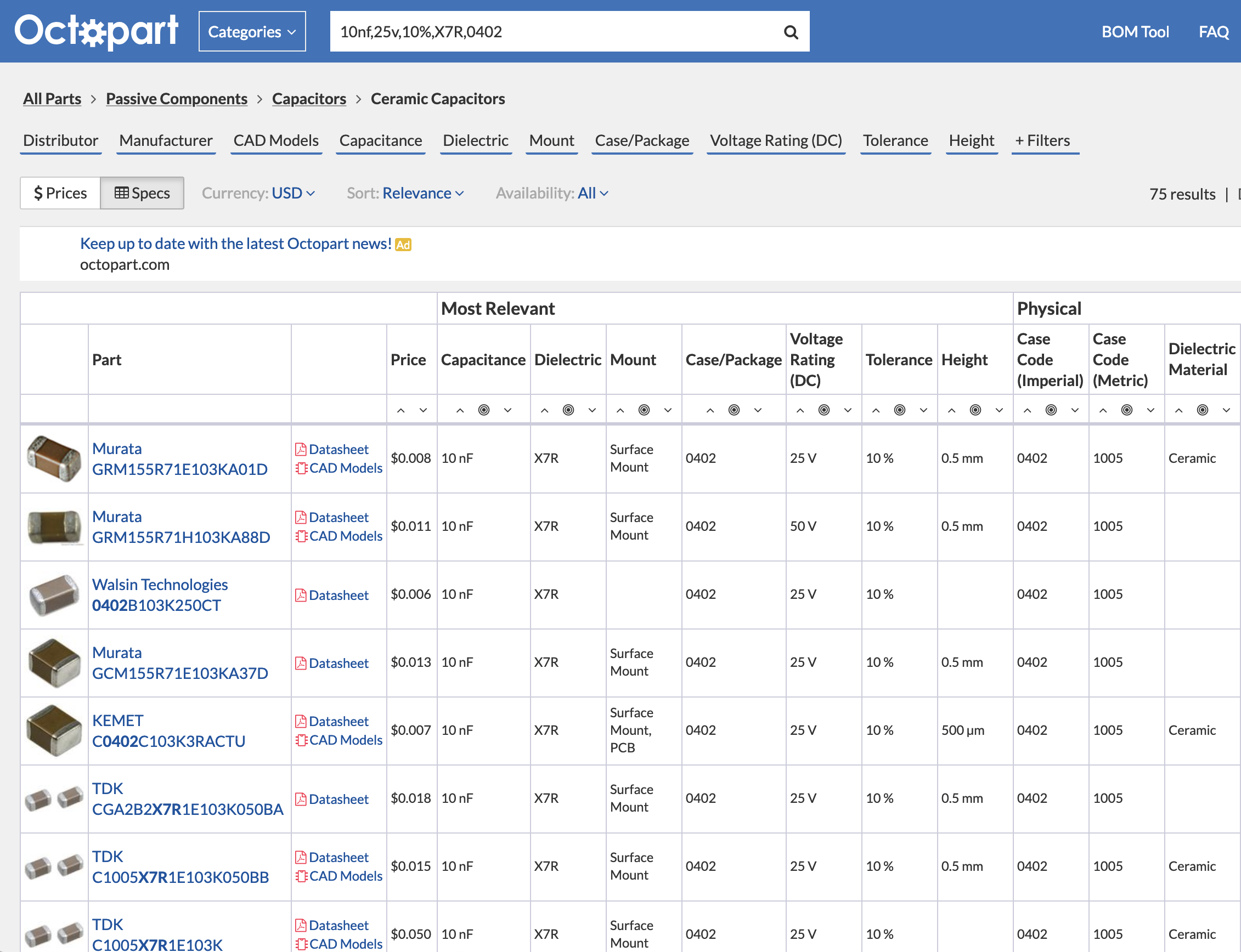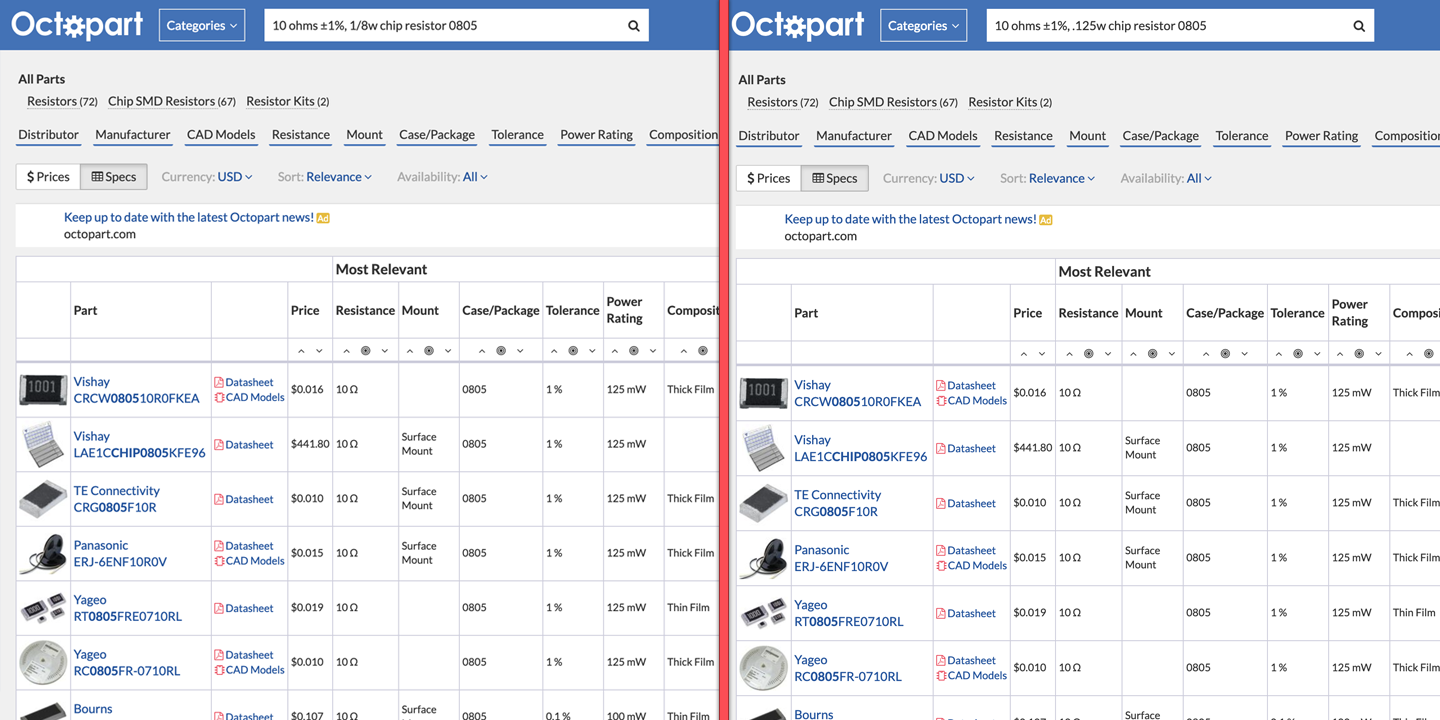Octopart’s search algorithm just got a lot smarter.
Octopart can now identify numbers, units, and fractions within your search query and match them against part data specifications. This is a way for the search engine to determine the possible intent of your search–similar to suggested categories–in order to return the most relevant results possible.
The update will increase the overall quality of results by eliminating some non-relevant parts, while at the same time, returning a more exhaustive set of suitable parts.
In other words, if a part is missing specification data (which is unfortunately all too common), our algorithm can now find parts that have spec data somewhere in their descriptions, increasing the relevancy of your results and allowing you to search parts that would not have been included in the results prior to this update.
The other fun benefit to this update is that no matter how you want to write it, we’ll be able to understand what you’re looking for.
You can now search by unit names like ohms, watt, volt, amp, farad, or use their respective symbols! Write specs as integers, decimals, or whole number fractions! Fractions! (We are particularly excited about this capability if you couldn’t tell.)
We’ll also understand your search regardless of where you put your spaces. No more wondering how to write your query. Write it your way, Octopart will understand.
Now you may be thinking, “Haven’t I always been able to search by specs on Octopart?”
This is technically true! You have, but it was reliant on clean and complete technical data: something that is not always available, and a problem we are constantly chipping away at. Now, however, the algorithm recognizes that when you search for “1/4 W resistor”, you’d like to see resistors that have “.25 w” in their specs. We no longer need to rely on a strict 1 to 1 text match. Now we can recognize the spec you’re searching for, and match it against different permutations of ways to write the specification, located in the technical data for the part or the part’s text description.
Let’s take a closer look at some of the possible ways you can now search on Octopart:

You can see here that when you enter the query “10nf,25v,10%,X7R,0402”, Octopart will recognize that these are most likely specs for a Ceramic Capacitor and offer a category to filter your query by.

With the suggested category filter applied, this specific query returns 75 results, with the top results being ceramic capacitors that meet the specs in the query. (Note: the actual number of results may change day to day depending on part availability, new parts, or parts that have been removed from our database.)

Switching to Specs View provides an even better example of how the new algorithm matched comma grouped specs in the query to parts with those specs.
Other examples that show off the new feature include “10 ohms ±1%, 1/8w chip resistor 0805”, which displays results that contain 125 mW for their power rating. Here the algorithm understands that 1/8w is equal to 125 mW. If it had been written as .125 W, the same results would be displayed. 1/8 W, .125 W, and 125 mW all mean the same thing and now our part search engine knows that.

Same results with 1/8w and .125w.
There you have it, a more intuitive and flexible Octopart search experience.
This is by no means the final version of this feature either. In the future, you can look forward to broader support for symbols, and additional units.
Currently, Octopart provides enhanced query support for the following units and their abbreviations: ohm, watt, volt, amp, farad, henry, hertz. Octopart supports combining these units with whole numbers, decimals, and fractions as well as the following metric prefixes and their abbreviations: pico, nano, micro, milli, kilo, mega, giga.
Additionally, we are working on adding enhanced support for more units like distance, temperature, angular degrees, percentages, and “compound units” like “amp-hour.”
Try it out for yourself! Let us know what you think or if you’ve found results that do not match your search. Your feedback helps us constantly tweak and improve our algorithm, so don’t hesitate to reach out!